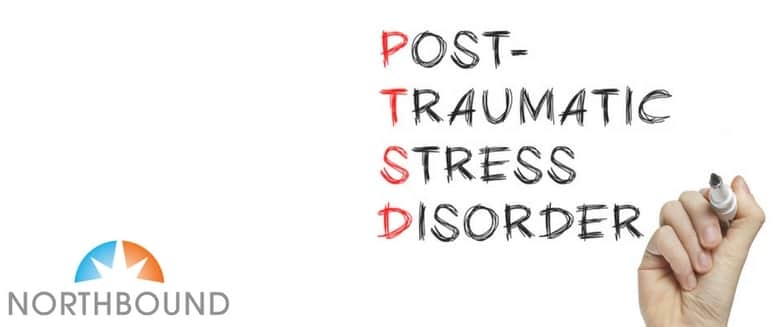Everyone experiences trauma in their lives, and how we respond to and cope with it helps to shape who we are. Oftentimes we process these traumas and move on without any major consequences. However, sometimes the impact of these traumas linger or the event is more serious and hard to overcome. This can result in post-traumatic stress disorder or PTSD. Approximately 3.6 percent of American adults will experience PTSD each year. This equates to around 5.2 million people.
What is Post-Traumatic Stress Disorder?
Many people assume that PTSD only affects military personnel and those who have experienced war or major disasters such as the attacks on 9/11. However, PTSD can arise from any number of events including abuse, rape, natural disasters, life-threatening accidents, witnessing a serious or violent act, sudden death of a loved one, or other traumatic events. They may experience flashbacks or nightmares about the event that go on for months or years and interfere with their daily life.
People with PTSD are often in a constant state of fight or flight or feel like they are reliving the event over and over again. They may try to avoid people or places that remind them of the incident or become hypervigilant.
PTSD and Addiction
Some people turn to drugs or alcohol as a way of trying to cope with PTSD symptoms. They may use these substances to try to relax, clear their mind, and forget about what happened. However, drugs and alcohol can actually exacerbate symptoms and make depression, anxiety or insomnia even worse.
In some cases, addiction can be a contributing factor to PTSD. Living a lifestyle of active addiction, a person may witness friends overdosing and potentially dying, may make risky decisions that get them into dangerous situations, or may be traumatized as the result of the type of lifestyle they are leading while in active addiction. PTSD and addiction can be inextricably intertwined making treatment even more complex and recovery more challenging, but possible to overcome.
Treating PTSD and Addiction through Trauma-Informed Care
Not everyone who experiences trauma develops PTSD, but everyone with PTSD has experienced trauma. Northbound recognizes the deep impact that trauma can have on a person’s life, whether they realize it or not. The behaviors and actions they exhibit – which can include substance use – are often driven by this underlying trauma. In order to support clients in overcoming PTSD, trauma, and addiction, Northbound offers trauma-informed care.
The basis of trauma-informed care is acknowledging that trauma has occurred and working with our clients to process these events and the effects they have had on their life. It also helps them to put in place strategies to prevent re-traumatization and continue moving forward in their recovery. Once our clients recognize that there has been trauma in their life that has had a lasting impact, they can begin to process these issues. Recovery from trauma can be a life-long process, but one that can be effectively managed.
Stages of Trauma-Informed Care
Reduce symptoms: One of the first things that we help our clients do is reduce their symptoms. Symptoms such as avoidance and hypervigilance can interfere with their ability to process their trauma. Therapies such as Eye Movement Desensitization and Reprocessing (EMDR) can be very effective at reducing symptoms quickly and brings our clients back to a baseline where they are ready to start working on addressing their trauma.
Psychoeducation: Next, we provide education about trauma through psychoeducation. They focus on topics such as what trauma is, safety, identifying core beliefs, and recognizing how trauma affects intimacy, power, choice, and control. The more they understand about themselves and how the event impacted them, the more in control they can feel. They realize that they are not weak and that it is the result of trauma. Northbound has a 12-week curriculum that clients work through culminating in a focus on post-traumatic growth and seeing how they can use their experience as a learning process and what they have gained from it.
Safe environment: It is also important that our clients feel safe at Northbound. They are enveloped in an environment where they feel comfortable and are not threatened. They realize that they will not be hurt, are not in danger, and help is available. This helps establish trust so they can begin opening up and working through challenges in an honest way.
Process trauma: The next step is to work with our clients on processing the trauma they have experienced. This does not necessarily mean dealing directly with the traumatic event. Trauma impacts so many aspects of a person’s life including how they perceive themselves and the world around them, their ability to trust, their assumptions about people and the world, and their ability to feel that they are in control and have a choice.
Treatment modalities including EMDR, cognitive processing therapy, gender-specific trauma process groups, and experiential therapy may all be applied in different ways. Our clients are able to explore their trauma, work through challenges to their core beliefs and see that they are empowered by their lives and their future. Slowly they reintegrate their sense of self and trauma into their identity, recognizing that their trauma does not define them – it is only one part of their life and who they are.
Ongoing recovery: Following treatment, clients learn how to cope with trauma recovery on a daily basis. Each event that happens to them can either magnify the trauma they have experienced, or reinforce their positive beliefs about themselves. They learn strategies to support improved mental health and healthier coping mechanisms that do not involve drugs or alcohol. Trauma work is ongoing, but can support a sustainable lifestyle of recovery.
Trauma is a part of life, but it does not have to be the controlling factor. Northbound’s trauma-informed care track can help you to overcome trauma and addiction and rebuild your life. We guide you each step of the way and give the appropriate level of support, evidenced-based treatment and progressive independence to thrive. PTSD and addiction are challenging and complex issues to deal with, but Northbound provides the personalized attention and trauma-informed care for recovery.
If you’re struggling with PTSD and addiction, contact Northbound to learn more about our trauma-informed care services.
Author
-

President, CEO & Founder at Northbound Treatment Network
Paul Alexander is the CEO, President & Founder of Northbound Treatment Network in Newport Beach, California. He believes wholeheartedly in transformational leadership, organizational health and effective, fully integrated substance use disorder and mental health treatment. With over 27 years of experience in behavioral healthcare, Paul has extensive knowledge of “in vivo” treatment modalities, clinical development, operations, strategy, marketing and financial planning. He has been widely recognized for his development of collegiate-based residential treatment programs for students in recovery and authored a research study at The University of California confirming this modality’s effectiveness.
Paul’s comprehensive professional experience, willingness to innovate, and emphasis on organizational health are vital factors in Northbound’s continued success. Paul received his Certified Addiction Treatment Specialist training at Saddleback College in Mission Viejo, CA, and was awarded Outstanding Alumni Service Award in 2002. Paul holds a Bachelor of Arts degree in Criminology, Law and Society, Summa Cum Laude, from University of California, Irvine, and a Juris Doctorate degree from Loyola Law School of Los Angeles. Paul currently serves on The National Association of Addiction Treatment Providers (NAATP) board. In addition, he serves on The Family Recovery Foundation board and The CarePossible board in Orange County; both organizations are committed to raising funds for family recovery and treatment for former military personnel. Paul is in recovery himself and lives in Orange County with his wife Silvana and his two young sons, Noah and Dean.










